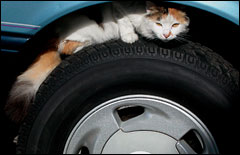Sure, you’ve heard of corn and switchgrass as potential sources of biofuel. But those are rendered totally boring in light of the potential of trash, dead cats, and human fat to meet our energy needs.

Make your engine purr.
Photo: iStockphoto
Surprising sources abound in the world of biofuels, with researchers probing the farthest reaches of their imagination in hopes of spinning gold from — well, crap. Take a look.
Ass fat: We like big butts and we cannot lie — especially when we use our own to power a speed boat. Or better yet, use other people’s.
Bones: A Missouri plant is already turning turkey bones, beaks, feet, and feathers — hell, probably even the gobble — into oil. Townsfolk think the idea stinks, but are willing to take it in the name of a sustainable future.
Chicken chub: According to the Des Moines Register, beef- and chicken-processing giant Tyson Foods Inc. hopes to use animal fat from its many slaughterhouses to develop biofuel. On the other side of the world, a Vietnamese company plans to spin catfish fat into fuel.
Credit-card statements: Scientists in Germany want to use specially engineered bacteria to break down paper waste to develop biofuels.
Hemp: Oh, cannabis. What can’t you do?
Flowers: Bouquet from your ex? Ugly hanging plant from your in-laws? Eco-fuel source!
Fluffy: Finally, a good use for cats. Goodbye, kitty.
Leftovers: Mmm, last week’s tuna noodle casserole never smelled so sweet. U.K.-based Inetec is developing a system for on-site processing of everything from greasy pizza boxes to leftover chicken patties. But don’t expect some sort of Mr. Fusion to hit the market anytime soon — or trash-powered time travel either, for that matter.
Pond scum: Researchers at GreenFuel Technologies Corp. in Massachusetts turn algae into fuels like methane, biodiesel, and ethanol. Swamp Thing is petitioning for an add to the endangered species list.
Poop: Giving new meaning to the phrase “when pigs fly,” Virginia-headquartered hog hocker Smithfield Foods Inc. has invested in technology to turn the waste from the 7.5 million pigs the company slaughters every year into transportation fuel.
Whey: Little Miss Muffet be damned. We’re using your curds and the liquid surrounding them to power our car. No way? Yes, whey!

